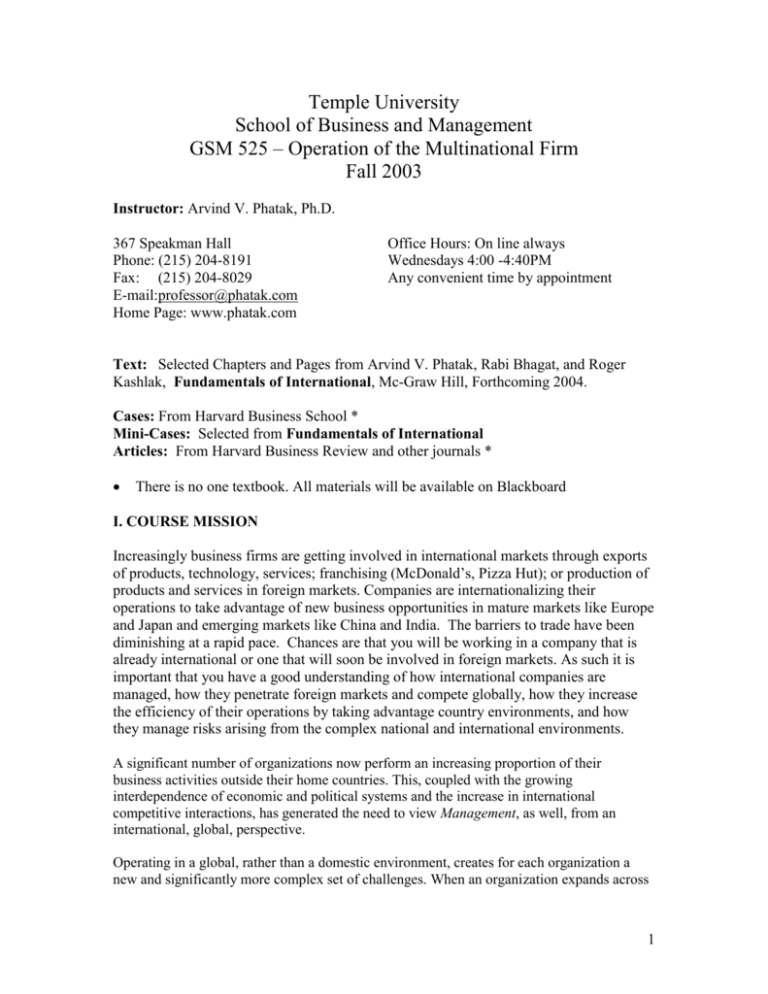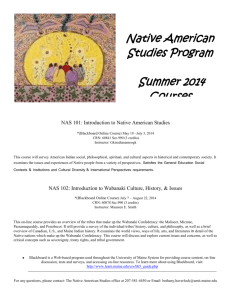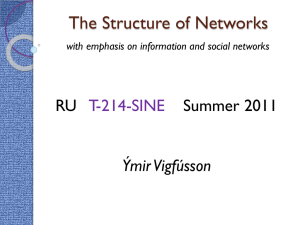Course Schedule and Assignments
advertisement

Temple University School of Business and Management GSM 525 – Operation of the Multinational Firm Fall 2003 Instructor: Arvind V. Phatak, Ph.D. 367 Speakman Hall Phone: (215) 204-8191 Fax: (215) 204-8029 E-mail:professor@phatak.com Home Page: www.phatak.com Office Hours: On line always Wednesdays 4:00 -4:40PM Any convenient time by appointment Text: Selected Chapters and Pages from Arvind V. Phatak, Rabi Bhagat, and Roger Kashlak, Fundamentals of International, Mc-Graw Hill, Forthcoming 2004. Cases: From Harvard Business School * Mini-Cases: Selected from Fundamentals of International Articles: From Harvard Business Review and other journals * There is no one textbook. All materials will be available on Blackboard I. COURSE MISSION Increasingly business firms are getting involved in international markets through exports of products, technology, services; franchising (McDonald’s, Pizza Hut); or production of products and services in foreign markets. Companies are internationalizing their operations to take advantage of new business opportunities in mature markets like Europe and Japan and emerging markets like China and India. The barriers to trade have been diminishing at a rapid pace. Chances are that you will be working in a company that is already international or one that will soon be involved in foreign markets. As such it is important that you have a good understanding of how international companies are managed, how they penetrate foreign markets and compete globally, how they increase the efficiency of their operations by taking advantage country environments, and how they manage risks arising from the complex national and international environments. A significant number of organizations now perform an increasing proportion of their business activities outside their home countries. This, coupled with the growing interdependence of economic and political systems and the increase in international competitive interactions, has generated the need to view Management, as well, from an international, global, perspective. Operating in a global, rather than a domestic environment, creates for each organization a new and significantly more complex set of challenges. When an organization expands across 1 national boundaries it often faces conflicting patterns of demands and expectations. Consumer preferences are more diverse. Financial management is significantly more complex due to fluctuations in exchange rates. Governmental policies and regulations cease to be relatively consistent and predictable. Union demands and human resources management strategies may vary from national context to national context. Organizational structures tend to become more complex due to geographical diversity, distance, time, language and culture. And then there are the inherent difficulties of operating in countries with different legal ideological, cultural and economic systems. Moving beyond national boundaries requires the development and implementation of a global strategy to achieve competitive costs, market penetration and effective resource allocation. The challenges and demands implicit in operating in the global economy and the type of organizational and strategic adaptations a manager must make, define the basic parameters of this international management course. Thus, within this context, GSM 525 will help you to develop the set of skills, and the knowledge and sensitivities necessary to manage successfully in the global environment. The course focuses upon management strategies as opposed to enterprise functions (Finance, Marketing, Accounting, Management Information Systems, etc.) Emphasis is on management functions (organizing, controlling, decision-making processes) as perceived, defined and implemented within multinational and transnational corporations, and which are significantly different from those prevalent in purely domestic organizations. II. EDUCATIONAL OBJECTIVES: GSM 525 will help you: 1. To develop a frame of reference through which to analyze and assess the diverse factors that influence: a) the development of international management and of transnational corporations, and b) their impact on national economic and socio-political contexts. 2. To assess the peculiarities of the diverse factors that influence strategy development in multinational corporations. Particular attention will be given to the economic, legal, governmental, political, global industry requirements and cultural environments in which multinational corporations operate. 3. To analyze the often conflicting demands and influences, particularly relevant to international and global strategic definitions, emerging from the interplay between the interests of nations and those of multinational corporations. 4. To analyze the issues involved in the translation of strategic decisions into operational activities. Particular attention will be given to the organization of the multinational organization and to the implementation issues facing those who manage across national boundaries. Critical operational issues will be assessed from the perspective of: a) The Corporate Level Manager on issues related to the building of a worldwide organization structure and the managerial processes that would allow him/her to effectively coordinate and control highly diversified geographical operations. b) The Host Country Manager who at the local level attempts to reconciliate the demands from local markets, from national unions and host governments with the strategic, global, objectives of the corporation. 2 III. SUGGESTIONS AND STUDY QUESTIONS FOR READINGS AND CASE ANALYSIS: The following are some guidelines to help you in your readings and case preparation: 1. You are required to have completed a thorough preparation of the case or readings to be used for class discussion. This means understanding - to a level of decision-making and action taking - of the case or reading. Details in case analysis are always important. Do not settle just for a general understanding. If you do, you will not be able to provide more than generic answers, and those generally do not lead to specific recommendations/actions. 2. Trace time frames, events, decisions, personalities and contingencies. Always assume the role of the manager facing a difficult decision, then make a decision, and show your supporting evidence for the decision made. Anticipate how you would implement it. What changes would you make in terms of resource allocation, people, systems, structures and in your approaches to the external environment? Your analysis is not complete unless you show why, and how your decision has been arrived at. IV. COURSE STRUCTURE AND REQUIREMENTS This is a hybrid course that combines both in-class and on-line study. The class will meet every other week and study on-line via the Blackboard platform at other times. The boundaries of the course are not limited to the contents of the text. In reality, you will find that many facts and events discussed in the text are now obsolete even though the underlying concepts still hold true today. I encourage you to surf on the web for newspapers and magazines from around the world. I also encourage you to give the class useful URLs on the web that you have discovered. Learning in the course will occur through a combination of in-class sessions, asynchronous discussion and chat sessions within groups, and asynchronous discussion sessions with the entire class of course materials such as articles, chapters from my book, and analysis of cases. Several cases will be discussed throughout the semester. We will also discuss several mini-cases. Cases and mini-cases are designed to illustrate and apply concepts developed in the course. Please come to "class" fully prepared to discuss the cases, articles, and other reading assignments. Class Participation: This will be a very student driven course. It will be the responsibility of students to actively participate in the class discussions. Simply stating the facts in the case, or merely agreeing with what others have already said is not class participation. There are no right or wrong answers. Our interest is in the arguments/statements you make and in the plausibility of the reasons you offer to support them. You will not be graded on whether you agree or disagree with the instructor. The evaluation of class participation will be based on your ability to raise and answer important issues, to contribute ideas or insights, and to build upon the ideas of others. The value you derive from this course depends on the quality of inputs provided by your 3 colleagues during the in-class discussion and the discussion board on Blackboard By actively participating in the class discussions, you can sharpen your insights, and those of your classmates. One way of making a contribution is to critically assess the comments of your classmates and/or the instructor; another is to infuse a "fresh" perspective on issue(s) under study by the class. It is important to realize that it is the quality of discussion not the quantity that affects your grade. Speaking too much while not adding value will be as detrimental as not participating in the class discussion. You are required to assess the quality of arguments of your colleagues based on their assumptions, conceptual tools applied, and overall consistency of analysis before criticizing their recommendations. Critical listening, questioning, and building from the analysis of other students can help in enriching the quality of group discussion Therefore, by class participation we mean "meaningful" comments that add value and enrich learning in the on-line environment. The role of the instructor is to act as a moderator in this group discussion during the case analysis. Since class participation is important, and most students want to participate, you may have to fight for airtime to be heard and recognized. Make it a habit to be heard at least once in each class to start establishing a record of class contributions. This means again a good, prior to the class, readings and case preparation. Failure to participate penalizes you and the class in many ways. For example, 1) you lose the opportunity to develop communications skills, 2) you deprive us of your insights, and 3) your ideas go unscrutinized and evaluated by others. Attendance in discussion sessions alone will not generate points for class participation. The onus of learning in a hybrid course is upon you. My role will be to facilitate learning by each student. However, it will be up to you to learn the materials by a thorough reading of the assignment materials, through interactions with your fellow classmates, and by sharing your knowledge and insights with each other. Lesson Management Plan: I will post questions and issues for articles, chapters, and cases in the Assignments section in Blackboard no later than Friday 5 PM for each bi-weekly cycle. Each bi-weekly cycle begins on the day after class on Thursday morning and ends on the Tuesday evening the day before the next class on Wednesday. I will also start the discussions for the entire class by posting Discussion Forum(s) on the Discussion Board in Blackboard. Individual Project: (1) You will be required to submit five articles from the business press (not academic journals). Each article should illustrate a single concept discussed in the course. No two articles should illustrate the SAME concept. Make copies of the articles, and provide complete references to where they came from, the date of publication, page numbers, the author, etc. Suggested business newspapers and magazines include Wall Street Journal, The New York Times, Los Angeles Times, San Jose Mercury, etc. Magazines include Business Week, Fortune, The Economist, The Far Eastern Economic Review, etc. A good way to start is to search for a topic on one of the several search engines like Yahoo, Google, Dogpile, etc. (2) Take each article and explain how it demonstrates the application in real-life of the concept or topic. 4 Mid term Exams: The mid-term exam will be on OCTOBER 22nd. Please make sure that you clear your respective calendars for this date from all other obligations that could prevent your from attending the mid-term exam. The midterm exam will include all materials covered to that date. *** Those who cannot attend the mid-term exam will be given a grade of NR (unless there is evidence submitted of a medical or other emergency) Final Exam: The final exam will be administered on December 11th. Please make sure that you clear your respective calendars for December 17th from all other obligations that could prevent your attending the final exam. The final exam will cover all materials in the course*** Those who cannot attend the final exam will be given a grade of F (unless there is evidence submitted of a medical emergency) Course Grade Measurements: Class Participation Mid Term exam Home Assignment Final Exam 30 % * 20% 20 % 30 % * I will provide you with your class participation grade every two weeks. Your privacy will not be compromised. I will also post the range (0 - 100) of class participation grades on Blackboard. The objective of making class participation grades public is to allow students to benchmark their performance and convey my expectations regarding the quality of class participation. Communicating with Professor Phatak for questions pertaining to the course contents: Use the Digital Dropbox in Blackboard to communicate with me on course content issues. ALWAYS USE THE BUTTON "SEND FILE" in DIGITAL DROPBOX. Do not click on Add File. You may send me an e-mail (professor@phatak.com) for private matters only. For technical questions about Blackboard please refer to the contacts listed in Announcements under the heading of Blackboard Support. WHAT YOU WILL GET OUT OF THIS COURSE If past experience is any indication of what you should expect in the course, students who have taken this course have given very high marks to the course contents and its relevance to the world of business of today. The non-international courses that you take in the MBA curriculum are important however they cannot cover the international dimensions of management, which will be covered in this course. As such, this course would add value to your business curriculum 5 Class Decorum: Please be polite with your fellow students even though you may not agree with their points of view. Please refrain from side-bar conversations in class. Academic Honesty: This class will be conducted in accordance with Temple University's Plagiarism and Academic Cheating policy. Violations of this policy can result in a failure in the course. Course Schedule and Assignments Face-to-face in class sessions are to take place on week # 1,3,5,7,9,11,13 and 15. Topics covered on-line will be discussed in-class the following week. Date, and Week # September 3 (1) Introduction to the Course Discussion of how course will be managed Chapter 1: An Introduction to International Business Management Globalization of Business (lecture) September 4-16 (2) (On-line) Placing students in groups Taking pictures of students Chapter 2: Global Macro Economic Environment Chapter 3: Political Environment and Political Risk September 17 (3) (In-Class) CASE: Avon Products China (HBSP) & Discussion of previous week's topics September 18- 30 (4) (On-line) Chapter 4: The International Legal Environment of Business October 1 (5) (In-Class) Chapter 5: The Cultural Environment of International Business & Discussion of previous week's topics October 2 - 14 (6) (On-line) Globalization of Industries and Companies: Porter, "Changing Patterns of International Competition" (HBSP) October 29 (7) (In - Class)* *Mid Term Exam: 80 minutes 6 Exam will cover all materials and cases covered to date Guest Lecturer Following the Exam (tentative) October 30 - November 4 (8) Chapter 6: Strategies for International Competition Porter, Competing Across Nations (On-line) November 5 (9) (In-Class) Chapter 7: Modes of Entry into Foreign Markets Chapter 8: Managing International Collaborative Alliances & Discussion of previous week's topics November 6 - November 18 (10) (On-line) "Putting Your Fingers on Capability" (HBSP) Chapter 10: Controlling International Strategies and Operations November 19 (11) (In-Class) CASE: Lincoln Electric: Venturing Abroad (HBSP) & Discussion of previous week's topics November 20 - 25 (12) (On-line) Chapter 17: Ethics and Social Responsibility for International Firms November 26 - November 30 Thanksgiving Recess December 3 (13) CASE: Ben & Jerry's Japan ” (HBSP) & Discussion of previous week's topics (In-Class) December 11 - 16 Study for Exam (14) December 17 (15) (In-Class) Final Exam In-Class: Comprehensive covering all materials after the midterm exam. 7





